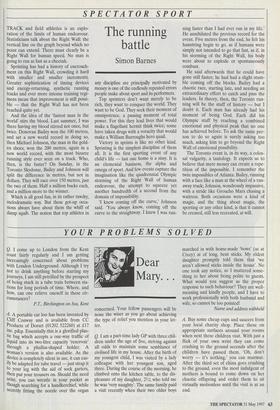SPECTATOR SPORT
The running battle
Simon Barnes
TRACK and field athletics is an explo- ration of the limits of human endeavour. Statisticians talk about the Right Wall: the vertical line on the graph beyond which no point can extend. There must clearly be a Right Wall for human speed. No man is going to run as fast as a cheetah.
Sprinting has had a history of encroach- ment on this Right Wall, crowding it hard with smaller and smaller increments. Greater sophistication of timing devices and energy-returning, synthetic running tracks and ever more intense training regi- mens mean that improvement is still possi- ble — that the Right Wall has not been reached quite yet.
And the idea of the 'fastest man in the world' stirs the blood. Last summer, I was there having my blood stirred not once, but twice. Donovan Bailey won the 100 metres, and set a new world record in doing so, then Michael Johnson, the man in the gold- en shoes, won the 200 metres, again in a new world record, with the most bizarre running style ever seen on a track. Who, then, is the faster? On Sunday, in the Toronto Skydome, Bailey and Johnson will split the difference in metres, but not in dollars. They will race over 150 metres, just the two of them. Half a million bucks each, and a million more to the winner.
Which is all good fun, in its rather tawdry, melodramatic way. But these got-up occa- sions always have about them the whiff of damp squib. The notion that top athletes in any discipline are principally motivated by money is one of the endlessly repeated errors people make about sport and its performers.
Top sprinters don't want merely to be rich, they want to conquer the world. They want to be God. They seek their moment of omnipotence, a passing moment of total power. For this they lead lives that would make a flagellant hermit think twice; some have taken drugs with a voracity that would make a William Burroughs hero quail.
Victory in sprints is like no other kind. Sprinting is the simplest discipline of them all. It is the first sporting event of any child's life — last one home is a sissy. It is an elemental business, the alpha and omega of sport. And few events capture the imagination like the quadrennial Olympic storming of the Right Wall of human endeavour, the attempt to squeeze yet another hundredth of a second from the domain of impossibility.
`I knew coming off the curve,' Johnson said. 'You always know, coming off the curve to the straightway. I knew I was run- ning faster than I had ever run in my life.' He annihilated the previous record for the event. Five metres from the end, he felt his hamstring begin to go, as if humans were simply not intended to go that fast, as if, in his storming of the Right Wall, his body were about to explode or spontaneously combust.
He said afterwards that he could have gone still faster; he had had a slight stum- ble coming off the blocks. Bailey had a chaotic race, starting late, and needing an extraordinary effort to catch and pass the leaders. In theory, then, the Toronto run- ning will be the stuff of history — but I doubt it. Each man has already had his moment of being God. Each did his Olympic stuff by reaching a combined emotional and physical peak that no one has achieved before. To ask the same per- son to do so again is surely asking too much, asking him to go beyond the Right Wall of emotional possibility.
The Toronto event is, in its way, a colos- sal vulgarity, a tautology. It expects us to believe that mere money can create a repe- tition of the impossible. I remember the twin impossibles of Atlanta: Bailey, running with a face like a man at the wheel of a run- away truck; Johnson, wondrously impassive, with a stride like Groucho Marx chasing a waitress. Both occasions were a kind of magic, and the thing about magic, the sporting or any other kind, is that it cannot be created, still less recreated, at will.


































































 Previous page
Previous page